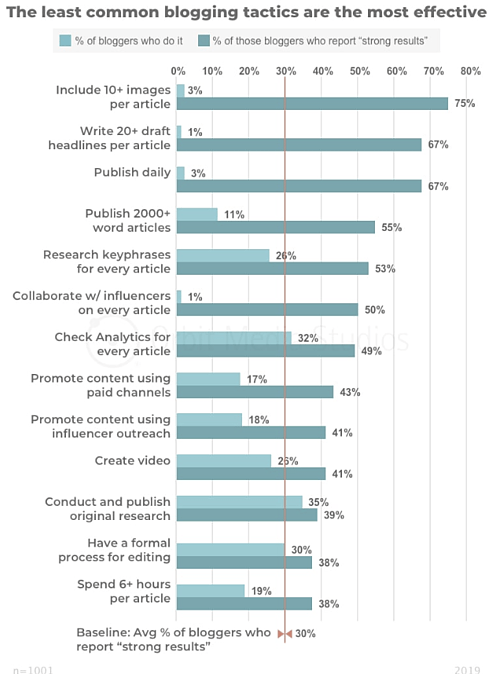Are Business Blogs Worth it?
If you're involved in a business you should absolutely consider its online presence.
Your company probably has a website and social media accounts. But are you taking advantage of SEO? Are business blogs worth it?
Yes they are.
HubSpot reported that half of the top 200 Fortune 500 companies had a corporate blog. And while that number is impressive, small and medium enterprises are still less likely to actively and consistently blog.
Are business blogs even worth it? This article will tackle this question head on and give you helpful guidance in making the right decision for your business.

What's the Difference Between a Website and a Blog?
First, let's start by clarifying and distinguishing two important terms: websites and blogs.
Websites
Websites can be thought of as an umbrella term where you can build webpages to suit your needs.
Business websites are generally formal, customer facing and are used to represent an organization. They provide a platform for multiple types of static content. In a content management system like Wordpress, where most websites are built, these are typically classified as 'pages'.
A business website may undergo slight updates from time to time with tweaks to copywriting, product or service offers, but typically pages like 'About Us' are mostly static and unchanging.
Check out our content update services here!
This makes websites relatively easy to manage for organizations whose limited resources may be focused on other things.

Blogs
A blog (also known as a Web log) is a website, or for this article, a section of a business website that provides relevant content to your business and potential customers.
In the CMS reference above, these are classified as 'posts' and are relatively dynamic.
It usually features a list of posts in reverse chronological order - in other words, most recent article at the top and oldest in descending order.
There are tons of different kinds of blogs. Anyone can start one and personal blogs are all over the internet allowing individuals to provide commentary or news on popular culture and current events.
They can also be used for affiliate marketing. This is where a blog posts reviews on all sorts of tangible and digital products with affiliate links to earn a commission on any resulting sales from blog readers. Other types of blogs include photo blogs and video blogs.
Blogs are similar in most ways to websites, but they are typically more personal in nature. Blog posts are usually less formal than websites, and can still include images, videos, and other media formats, targeting a specific audience.
There are many similarities between blogs and websites. For example, both have pages which contain certain components such as images, videos, text-based content or other types of media formats.
What are the benefits of business blogging?
One of the most important benefits of a company blog is that it’s a great way to build trust with prospects and customers by sharing expertise on a subject to become an industry leader.
Effective company blogs typically have high-quality content that is updated frequently with fresh information in order to keep it relevant. They maintain good writing skills in order to be both informative and entertaining to their readership.
This is one of the best ways to get your blog noticed and frequented by your target audience.
Blogging is effective for a business because it is an easy way to talk to potential customers about particular aspects of the business and share interesting ideas with the target audience. In doing this, blogging can help to promote a company, increase brand awareness, and build stronger relationships with potential customers.
This effort is not trivial. In fact, HubSpot recently found that marketers who prioritized blogging received 13X more ROI than those that didn't.
Let's not forget blogs are also a great place to accumulate inbound links if you can create content that relevant sites in your space find useful and can link to your content. Over time, these efforts compound and, when done right, your overall site can become stronger.
With this power generated from quality content and links confirming that quality, your competitiveness on Google will grow accordingly. You can then create blog posts on topics with high buyer intent relevant to your offering with a greater likelihood of ranking high on Google and gaining high-converting traffic. It's a lead generation tool that keeps on giving.
There are tons of marketing channels at a company's disposal and a business blog is certainly right up there with the best of them all. Studies have shown that companies with blogs gain an average of 67% more leads per month than companies without blogs.
Blogging is therefore a great potential way to build brand awareness, cultivate an email list, and connect with potential customers. It's a great place to communicate ideas or share new discoveries and to provide a human voice for an organization.
To succeed at accomplishing this, however, depends largely on managing a blog that provides relevant content.
Some blogs also offer the opportunity for readers to comment on the post and share their thoughts, which can lead to an engaging conversation between bloggers and readers. A successful blog is one that nurtures this, attracting shares and engagement.
Blog posts can also be broken up and repurposed to be used as content for social media posts on Facebook, Twitter, and LinkedIn. This further widens a company's reach to potential customers on various networks and allows you to link back to the original content on your site.
In short, blogging helps businesses generate more traffic, convert that traffic into leads, and those leads into sales.

Are there any drawbacks to blogging that need to be considered?
While blogging is one of the easiest ways to get your content out there, it does come with serious challenges that need to be considered.
The difficulties associated with blogging mainly come into play when you are trying to post consistently and on a regular basis. Regular posting of quality content can be essential for a company's ranking in Google.
Frequent additions and updates can keep a site fresh. And while that is all fine and dandy in theory, you may find that you or your team don’t have enough time or energy, or that you just aren’t feeling inspired enough.
This relates to a common struggle among bloggers regarding time management. It's hard enough trying to keep up with all of your duties as manager or owner of the company - let alone trying to find time for blogging too.
In order to keep your blog from stagnating, you will want to find a long list of topics to cover spread out over a content calendar, say, for the next 3 months. This will allow you to know in advance what you'll be posting for the next quarter.
However, you'll want to check what appears on page 1 of Google of any given topic when it comes time to do the blog writing though. It may be the case that the search intent has changed and may be a waste of time to go after during this time. A quick search will help this.
Another thing to consider is that blogging takes time to build an audience and there is no guarantee that it will actually have a significant impact if you aren't willing to do research.
Things that need to be considered include what keywords to use, the length of the article, and perhaps most importantly, the relevance and interest it serves to your target customer.
If you can manage to get some interest in your blog, keeping interest can be like surfing on a wave. Without skill and effort, you may soon find yourself falling into an ocean of disinterested readers indifferent to what you have to say.

It’s also very hard to find out what works with blogging because there are so many factors involved in determining success. Some blogs may die very quickly while others may take years before they become relevant or interesting enough for anyone to care about them.
One of the challenges of blogging is that blogs need consistency and regularity in order to generate an audience. It is important for businesses to understand it isn't overnight and their marketing strategies are long term.
Another thing that takes time is Search Engine Optimization (SEO). Among a variety of other factors, this requires lots of high-quality content, link building, and patience.
Google tends to rank websites higher in the search engine results pages if they have more quality content than similar competitors. So if your competition has active company blogs with tons of content and links, but your company only has one or two posts, then you may not be in competition for long.
What are the characteristics of a successful blog?
Your blog content can help you achieve your marketing goals. You'll have the potential to improve your site's Google ranking, social media marketing efforts, and drive targeted traffic to your website.
For this to happen, you'll want to make sure you cover various stages of the buyer's journey. This includes topics that newbies would search for - right up to those with some familiarity with the industry or niche.
A blog is content marketing 101. You want to inform, engage, and eventually persuade. This is not done through manipulation or cutting corners. You earn it with knowledge sharing through valuable content.
Business Blog Tips
- One simple piece of advice: Write list articles. Numbers attract the eye, especially when surrounded by letters and words in Google, so turning a blog article into a "listicle" (for example "7 Reasons why blah blah blah") has proven to be a very popular blog post format.
- Another helpful tip: Size matters. 55% of bloggers say they see results from blog posts with 2,000 words or more and that it has an impact on search engine rankings. This drives search engine traffic which results in a wider audience and a higher chance of having an impact.
- Tip #3: "A picture is worth a thousand words." Not literally, but certainly figuratively in the world of blogging. Effective blog posts contain images, receiving on average 90% more views compared to articles written without images. And the more images the better.
- In fact, more than 75% of bloggers say that including 10 or more photos in an article is extremely effective in driving traffic to their blogs. Surprisingly however, according to a study by Orbit Media only 3% of bloggers actually do this.
Conclusion: Should Your Business Start Blogging?
Blogging is an important pillar of digital marketing and, provided you are willing to put in the work, you can expect real tangible rewards.
But, before starting a business blog, businesses should be aware of the challenges of blogging and the drawbacks that can come with it.
Company blogs are worth the effort if you can provide content that your audience values. Asking them questions, and finding ways to generate audience engagement helps with building customer trust.
Audiences want to read more than just company news and they aren't necessarily looking for attention-grabbing videos.
Blogs are a great way for businesses to share their story with the world.
The struggle is being consistent. If you want help to develop a content plan for your business blog, or managing the execution of your business blog, reach out to us and we'll look at your needs and see what can be done.
For this and more, stick with 8-Bit Content.
Blog
Let’s grow your online visibility together!
Join our newsletter for actionable tips and checklists!
Contact Us
You can also find us here:





